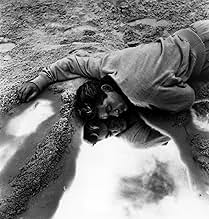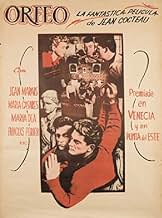A poet in love with Death follows his unhappy wife into the underworld.A poet in love with Death follows his unhappy wife into the underworld.A poet in love with Death follows his unhappy wife into the underworld.
- Nominated for 1 BAFTA Award
- 2 nominations total
André Carnège
- Judge
- (as Maurice Carnège)
Paul Amiot
- Judge
- (uncredited)
Philippe Bordier
- Young Man at Café des Poètes
- (uncredited)
Claude Borelli
- Une bacchante
- (uncredited)
Jean Cocteau
- Narrator
- (voice)
- (uncredited)
- Director
- Writer
- All cast & crew
- Production, box office & more at IMDbPro
Storyline
Did you know
- TriviaThe opening scenes set in the Cafe des Poetes were originally set to be filmed with regular extras. However, Cocteau found them to be too self-conscious and artificial so they were all dismissed. Instead, real bohemians from Paris' real café culture were drafted in. These proved to be so natural and relaxed with the café setting, they actually stayed on for two extra days after filming had finished, just hanging out in the cafés that the film crew had been using.
- GoofsWhen Orphée is shot, the gun falls near his right foot. However when Heurtebise picks up the gun; the orientation changes and it is now near his right hand.
- Quotes
Heurtebise: I am letting you into the secret of all secrets, mirrors are gates through which death comes and goes. Moreover if you see your whole life in a mirror you will see death at work as you see bees behind the glass in a hive.
- ConnectionsEdited into Histoire(s) du cinéma: Une histoire seule (1989)
- SoundtracksDance of the Blessed Souls -- from Orphée et Eurydice
Written by Christoph Willibald Gluck
Featured review
There's nothing better than a dark involved movie about death to bring you out of your blues. Having been laid off today from a high-tech, high-paying job, I find that this is a far better escape from my blues than getting skunk-drunk. Now I'll be able to afford the time to see such movies...this was at the Brattle Theater, an arts movie house in Cambridge that regularly shows movies written when brains were necessary to write a script that would be made into a movie. Of course, I saw it way back when but the mark of a good movie is that you see a different movie every time you see it, because YOU change and your interpretation therefore changes. The surreal scenes in the Underground evoke many other images, and, because of their wierdness, cannot be forgotten. It raises questions about the 'finality' of death, and the relative unimportance of so much in life (including jobs/employment). The love of the two protagonists for one another is especially intriguing, since Cocteau at first gives you the impression that Orpheus is a narcissistic writer only in love with himself.
The fierce command for Orpheus NOT to look at Eurydice reminds you of Lot's wife, as she turned into the pillar of salt. Of course, I still wonder why that part was in here.....maybe just to make us wonder about disobedience.
The mob throwing rocks at the house was indicative of mob mentality everywhere and anytime.
The motorcyclists, angels of death, remind you of "The Wild One" as they perform their ghastly tasks in the small French town. As the other dead people make their sacrifices for one another, with no mention of religion, you almost have a re-awakened faith in the power of love. Which is what religion is all about anyhow,-- not in the ghost stories we are told to help make the fear of death/nothingness more pallatable.
Cocteau was a genius, and his movies are unique. Invest in them while you can, and re-visit them from time to time when you need a reminder of how precious love and life are.
The fierce command for Orpheus NOT to look at Eurydice reminds you of Lot's wife, as she turned into the pillar of salt. Of course, I still wonder why that part was in here.....maybe just to make us wonder about disobedience.
The mob throwing rocks at the house was indicative of mob mentality everywhere and anytime.
The motorcyclists, angels of death, remind you of "The Wild One" as they perform their ghastly tasks in the small French town. As the other dead people make their sacrifices for one another, with no mention of religion, you almost have a re-awakened faith in the power of love. Which is what religion is all about anyhow,-- not in the ghost stories we are told to help make the fear of death/nothingness more pallatable.
Cocteau was a genius, and his movies are unique. Invest in them while you can, and re-visit them from time to time when you need a reminder of how precious love and life are.
- How long is Orpheus?Powered by Alexa
Details
- Runtime1 hour 52 minutes
- Color
- Aspect ratio
- 1.37 : 1
Contribute to this page
Suggest an edit or add missing content

































